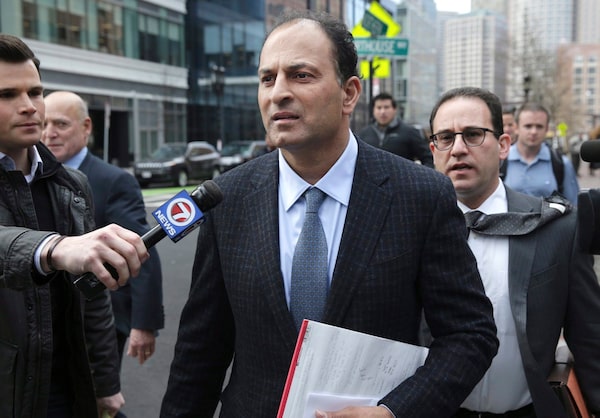
David Sidoo of Vancouver, seen here, leaves following his federal court hearing in Boston, on March 15, 2019.Jonathan Wiggs/The Associated Press
A well-known businessman and philanthropist from British Columbia faces fresh allegations in a new indictment filed in a college bribery scandal unfolding in the United States.
David Sidoo has already pleaded not guilty to charges of conspiracy to commit money laundering and conspiracy to commit mail and wire fraud in the case.
The new indictment does not add any charges but makes new allegations including that admissions consultant William (Rick) Singer wrote a fake college application essay for Mr. Sidoo’s youngest son in 2013.
The indictment alleges that the essay described Mr. Sidoo’s son’s purported internship with an organization that worked to combat violence among Los Angeles-based gangs.
It says the essay falsely claimed that the young man had been held up at gunpoint by gang members in Los Angeles, but Mr. Sidoo replied asking for the interactions with gangs to be reduced.
David Chesnoff, a lawyer for Mr. Sidoo, said in an e-mailed statement that his client will defend himself vigorously on the charges.
“Let me be clear," Mr. Chesnoff wrote. “The information released today are mere allegations from the mouths of admitted felons. Mr. Sidoo has a very robust defence that disputes these allegations.
“He looks forward to his day in court when we can present our side of this case.”
None of the allegations contained in the indictment have been tested in court.
According to the indictment, Mr. Sidoo replied to Mr. Singer’s first draft of his son’s essay saying, “can we lessen the interaction with the gangs. Guns …? That’s scary stuff. Your call you know what to look for.”
The revised essay, without the reference to guns, was later submitted as part of Mr. Sidoo’s younger son’s application for admission to multiple universities, the indictment alleges.
It also alleges that Mr. Sidoo asked Mr. Singer in 2015 to ask a Florida prep-school administrator named Mark Riddell to take either the business Graduate Management Admission Test or Law School Admission Test for his older son.
In exchange, Mr. Sidoo agreed to pay Mr. Singer a sum of money and Mr. Singer, in turn, agreed to pay Mr. Riddell about $100,000, the indictment says.
Mr. Singer and Mr. Ridell then allegedly researched the security measures for both exams and decided against Mr. Riddell taking the LSAT because of fingerprinting requirements.
Mr. Riddell wired $520 to China in December, 2016, to pay for fraudulent drivers’ licences that he planned to use to pose as Mr. Sidoo’s older son for the graduate management test, the indictment alleges.
However, the indictment says the false identifications were not high quality and Mr. Riddell decided not to take the exam on behalf of Mr. Sidoo’s son.
Previous indictments have alleged that Mr. Sidoo paid $200,000 to have individuals secretly take college entrance exams in place of his two sons.
The Justice Department says charges of conspiracy to commit mail and wire fraud and conspiracy to commit money laundering each carry a maximum sentence of 20 years in prison.
More than 50 people, including Hollywood actresses Felicity Huffman and Lori Loughlin, have been charged in the college admissions scheme. Ms. Huffman pleaded guilty, as have Mr. Singer and Mr. Riddell. Ms. Loughlin pleaded not guilty.
Mr. Sidoo, 59, is a former Canadian Football League player who retired from the sport in 1988 and pursued a career in brokerages and private investment banking. He has received the Order of B.C. and is a member of the B.C. Sports Hall of Fame.
Mr. Sidoo is not the only B.C. resident facing charges.
Xiaoning Sui, a 48-year-old Chinese national who lives in Surrey, B.C., was arrested on an indictment last month in Spain on one count of conspiracy to commit mail fraud and honest services mail fraud.
It is unclear whether Ms. Sui has a lawyer to speak on her behalf and the allegations against her have not been tested in court.
With a report from Ben Mussett